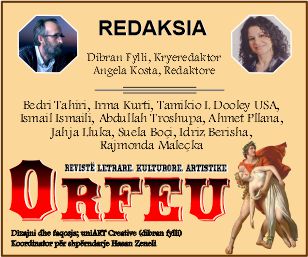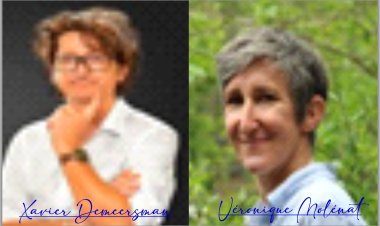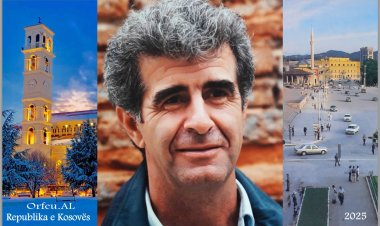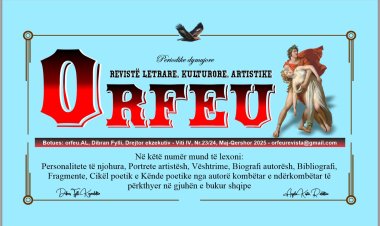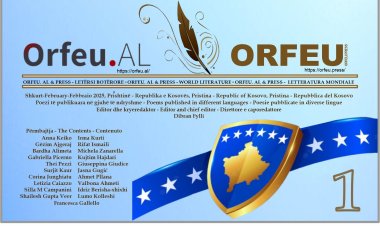Written by Mohamed Amjar (prepared Angela Kosta)

Reading the poetry collection (O Your Majesty) by the Iraqi poet and media figure Hamid Al-Majmai.
A poet and journalist who came with a group of writers in the eighties of the last century, known for his newspaper articles as well as his poetic whispers, a lover of the elegant word, a dreamy soul, known for his modesty, strength of character and soundness of opinion, known for his love for the lady of love, the one who captured his heart, she is the majesty who is strongly present in all his poems, known by the title of the monk of love and the poet of peace, and the poet of the land of love, he is the poet Hamed Al-Majmai.
Before moving on to reading the collection, we must briefly review the author of the collection. He is the poet, writer and media figure Hamid Al-Majmai, born in 1968. He was raised in a small rural house in the Tal Al-Asmar area in Diyala Governorate in Bzayez Khuraisan. He learned literature from his grandfather’s host and his parents, Abdul Muhammad. He took his literary education from the depths of his environment that embraced the Ashnouna civilization. He learned journalism at the hands of the well-known Arab radio broadcaster Saadoun Shafiq Saeed. He was active in the Popular Poets Association until he was elected Vice President. He is a founding member of the Iraqi Journalists and Media Union, and a member of He is also a founder of the Iraqi Journalists Union, a member of the Iraqi Artists Syndicate, a member of the Iraqi Theater Union, and worked as a broadcast director for the Holy Quran Radio. He received several awards, letters of appreciation, and shields of creativity through his activities and participation in several seminars and literary evenings, whether in Iraq or abroad, remotely. Perhaps the title of the Poet of Love and Peace from Diyala Governorate in Iraq, the title of the Poet of the Land of Love from the professors of Arabic literature in Algeria, and the title of the Monk of Love from Lebanon, are the evidence that he is proud of. As for his journalistic work, he was distinguished by the brilliance of his articles in several newspapers, such as Al-Sharq, Al-Thawra, Al-Jumhuriya, Al-Dustour, and Al-Manar..., and electronic ones such as Sada Al-Hayat Al-Iraqiya, Tadhkirat Hob, and Jalla Sajaal Al-Arab..., and he has television interviews with several Arab channels such as Al-Duroob satellite channel, Diyala, Al-Sumaria, Al-Iraqiya, and Al-Furat..., The poet Hamid Al-Majmai has two published poetry collections, (Land of Love), and (O Your Majesty), which we will get to know shortly. He stated that he has other works that have not yet seen the light of day, such as (O Daughter of Al-Sayyab) and (A Cry of Love in the Soul of an Immigrant), and the manuscript (An Iraqi Biography and Journey). He admitted that the reason for his delay in publishing has two reasons. First, he considers himself a journalist first and foremost, and poetry is a hobby of love for the word and an explosion of what is on his mind. The second reason is related to publishing houses, most of which he considers have become more concerned with materialism than with the value and sophistication of literary content. The cultural field also does not provide him with support. Material or moral by the relevant institutions, as well as the characteristic of selfishness and media hypocrisy, and the cancellation and marginalization of the other has overwhelmed the literary arena, and he has now become a mere consumer commodity, so verbal industries have increased and he has moved away from the basic topics, so he preferred to publish through his social media accounts rather than fall into the jaws of a publishing house that enslaves and exploits him, and to preserve Gaza itself, and to give free rein to his imagination and not make his pen a tongue that serves private goals and then throw it in the end into the trash can of history.
The collection of poems, “O (Her Majesty),” contains ninety-nine poems, varying between free, prose, and classical poems. They differ in type and also in their topics, between what is political and social, and what is spiritual and emotional. When you read them, you find yourself inside a garden with diverse roses, multiple colors, and breezes, fluttering with you in ecstasy, imagination soaring in the sky of the poem, as every interpretation you may present may suit it. Here, the creativity of the experienced poet, who is proficient in composing and weaving, is distinguished, investing in symbols with multiple meanings, taking you into a new world of knowledge and planting in you the curiosity to search. Perhaps the best example of this is his poem:
HOMELAND
I am the oldest creature of love
First homeland of life
Inanna Sumer's Heart
Ishtar Babylon
lyre of ur
The beauty of bodies
Tenderness of souls
The sanctity of Athtar
The salvation of the Arabs...
This is how love was born deep inside me...
We also find his poetic creations revealing to us his broad culture, between history and mythology, philosophy and psychology, the art of drawing and music, and technology from computers and social media technologies. He is a multi-faceted personality, keeping up with the developments taking place in the world as a whole and in the Arab part of it in particular. The best evidence of this is what came in his poem:
MONSTERS
Monsters
They want you to insult Plato
to pee on newton
Kill Venus and Ishtar
Mona Lisa burns
Damn Khalil and his sons
All computers are broken
Kill all the good people in the world...
The poems of the poet Hamed Al-Majmai are rich in metaphors and similes, sweet in their internal music, enchanting the hearts and delighting the minds.
My love
The people of the Earth are flirting with you.
The loving souls pledge allegiance to you
The strings of music clap for you
Beethoven and Ziryab bow to you
Morning sings in the voice of nightingales
The breeze kisses you on the cheeks of the rose.
What cannot be overlooked is that almost all of the poems in the collection (O Your Majesty) end with the phrase (Lady of Love), and in every poem you find a call for love and peace and the rejection of violence and ignorance, and contempt for sectarianism and blind tribalism, and all of this reflects the tolerant personality of our poet, who loves goodness:
Love kills in the grooves of wounds
Souls embrace before farewell
Ignorance rules the streets
The sky is crying, it doesn't rain
Sorrows inhabit the homes...
His obsession with women was not limited to love only, but rather extended to other dimensions. In a poem of his entitled (Eastern Woman), he calls for the liberation of Eastern women from the restrictions that control them; from customs, traditions, and habits that have no basis or purpose other than to demean and marginalize women. He talks about that woman who believes that her place is always behind the man and not beside him, that woman who considers herself worthless, and in fact, without her, nations would not have progressed, and without her, that man who is born weak and when his bones grow strong would not have existed. She is that mother woman who placed heaven under her feet, she is the sister, the wife, the teacher, and the doctor, she is the educator of generations:
I am an oriental woman
Ruled by customs!...
Be strong..
Liberated..
I hate that silence that restricts you..
Shake off the dust of shame
Fly with your femininity...
No society without you
Oh, tamer of lions
With you, longing grows
draws beauty
Dreams of love
Spread your beauty wings to the horizons
Write on your lips stories of hugs
Roll in my arms
I am thirsty and you are the rain
Inspire me to write my letters...
You find the personality of the journalist overwhelming the poet in the style and the simple, sweet language, and all that remains for the poet is his surging feelings and his inspiration, and the ambiguity of the symbols on which he relies:
Oh homeland of Al-Sayyab...
They slaughtered you with the sword of the Tatars
They killed the laughter of children in you
Sinbad's ship sank in the middle of the seas
They tore up the epic of Kalgamesh
Burn a thousand and one nights
They killed Hussein again
They destroyed the tents and homes.
They erased your civilization history
They disowned Sargon and Akkad.
And they lied, Or
They studied above the obelisk of Hammurabi.
And they crushed Assyria
No, my country...
Letter and pen generator
The sword of the enemy is not sheathed in you, nor kissed
I love you my country
Oh homeland of the lady of love.
You sometimes find Hamed Al-Majmai’s poetry to be a sad autumn full of sorrow, anger and revolution:
A wound that explodes my lungs
A face covered in dust
Black sun
Nour is looking for a match
All are traitors
Even love is a son of a dog
There is only holy hatred
Prayers are held for him.
No..I know why I reject my reality!
To live!
In a world ruled by the gun
Kill love....
You also find it full of joy, happiness, and romance, as if you were in a spring season with diverse flower colors, and its breezes rising on the horizon, heralding the onset of surging emotions:
-Come on, my love.
We wash the blood with camphor leaves.
We plant basil trees
We fly with angel wings
We heal our wounds with love
Only love makes peace
Come on my love...
-Let me hug you
Like a desert craving rain
Let the sky play its tune
Let the lights dance with the ecstasy of the evening
How beautiful I am when I hug you
Satisfy your loving sighs
I feel your lips relax in my mouth
I am drowning
over the adhesive pad
Where my chest becomes a soldier for your spears...
And eternal beauty dwells in your sanctuary.
In an interview with the poet Hamed Al-Majmai with the Iraqi newspaper Al-Sharq, interviewed by journalist Kamel Karim Al-Khailani, he was asked who his lady love is, so he answered that the lady love is for the reader, and in my life she is everything, place and time, nature, and human existence.. She is the mother, sister, and wife, she is the one burdened with the burden and groans of society, she is the city...
The poet Hamed Al-Majmai is considered a blessed fruit of the Tal Al-Asmar region and a source of pride for Diyala Governorate in particular and for Iraq in general, that country that has always been distinguished by its scientific and literary movements. Because of what Iraq has been going through recently, the poet has been displaced from his home and burned his office, which contained five hundred books. He is now in a very poor health condition, suffering from kidney failure. We wish him a speedy recovery, and we hope for the return of the peace he calls for to his country, Iraq. In conclusion, I leave you with this beautiful painting drawn with words, entitled:
SILENCE
Silence
I don't know what's happening to me
when i write your name
On top of the paper chips
My things tremble
My feelings are silent
Lines begin to pronounce
I smell smoke
My body or my heart is burning
Tears up the longing
I turn into atoms..
Rather, more precisely..
Feel your body
Even the lips
And between the two breasts, where drowning strikes me
I am love..
I am the pain..
I am insomnia I am a lote tree bird caressed by the gentle breeze I am a land that sings to the beauty of the drizzle I am the morning I am the night I am the sunset I am the twilight I am everything about you today, yesterday and what came before I tell you with all the feeling of true love I love you, lady of love.
Source: - Diwan Ya Sahibat Al-Jalalah by the Iraqi poet and media figure Hamed Al-Majmai.
- Al-Sharq Al-Iraqiya newspaper (Interview with the poet Hamed Al-Majmai)
(Media figure Hamed Abdul Mohammed Al-Majmai)
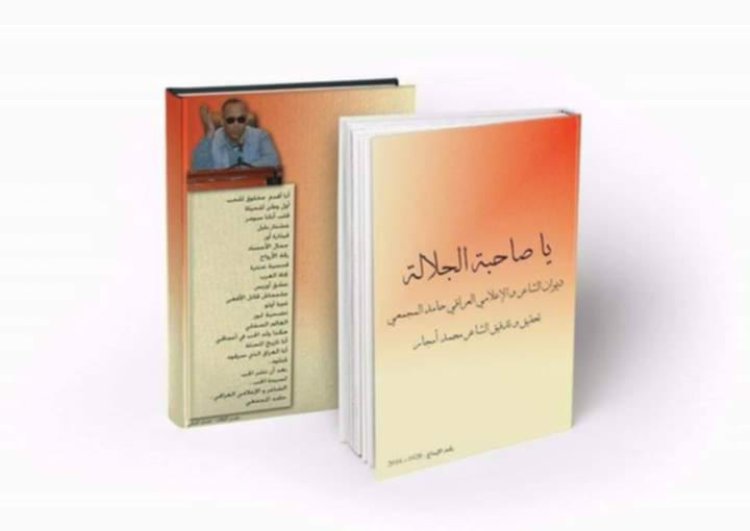
Hamed Abdul Majmai was born in 1968 in a small rural house in the Tal Al-Asmar area in Bzaiz Khreisan. He learned literature from his grandfather and father Abdul Muhammad, and listened to his grandmother's stories taken from the world of imagination. He took his literary teachings from the depths of his environment that embraced the first civilizations; Ashnuna; after graduating from middle school, he entered a technical institute but did not graduate from it due to the frustration that struck him as a result of not appointing those with certificates. His first start was as an art enthusiast until he met his friends in middle school and worked with them. He joined the Adwaa Shabab Baquba troupe, directed by the wonderful Dr. Ibrahim Al-Nima. He did not continue long in the world of theater. He belonged to the Association of Popular Poets in Diyala to begin his first poetic career through which he became acquainted with the cultural milieu. He studied under the great writer and broadcaster, Professor Saadoun Shafiq Saeed, whom he considers his spiritual father.
He came with a group of young popular poets in 1989, such as: the poet and writer Jassim Al-Hanoud, the handsome poet Ayoub Al-Obaidi, the late poet Ibrahim Ramadan, and the martyred poet Haider Al-Hussaini. The great credit in this field goes to the great writer and poet Mahmoud Mu’awwad Al-Ghazi, may God have mercy on him, who led him to the Popular Poets Association to meet with a large elite of great poets, such as the great poet Yassin Al-Yas, who took him by the hand to letters that set out towards creative innovation.
The poet worked in most Arab and international institutions and cultural civil society organizations, most notably:
Head of the Arab Creatives Association, Iraq Branch
Vice President of the World Creatives Association
Member of the Popular Poets Association until he was elected Vice President.
Ambassador of Arab Creators for Literature, Culture and Media
Founding member of the Iraqi Journalists and Media Union.
Founding member of the Iraqi Journalists Union.
Member of the Iraqi Artists Syndicate.
Member of the Iraqi Theatre Union.
Broadcast Director of the Holy Quran Radio.
He founded the international Balalama News Agency for Culture and Arts. He left it after he founded the international Add News Agency for Culture and Arts, of which he works as director.
He wrote hundreds of articles in local and Arab newspapers: Al-Qadisiyah, Al-Thawra, Al-Jumhuriya, Maja, Alif Baa, Al-Raased, Funun Magazine, Al-Sharq Al-Iraqiya, Al-Masir, Iraq, Al-Dustour. He worked as managing editor of Sawt Al-Ahrar, and editor-in-chief of Awraq Thaqafiyyah, as well as Al-Sabah and Al-Sabah Al-Jadeed. He worked in Diyala TV, but because it did not meet his ambitions, he left it. He has thousands of articles and poems in Arab and international websites.
Chairman and Editor-in-Chief of Sada Al Thaqafah Magazine
Published in Al Hadath Al Maghribia and many Algerian newspapers.
Many Arab writers wrote about him, including Dr. Aziz Montaser, Professor Haizia bint Mulla Malal of Algeria, and the Moroccan poet Mohamed Amjar in reading the poems of the collection, Ya Sahibat Al-Jalala.
He received an honorary doctorate from the Institute of History, and today I am the editor-in-chief and board director of Sada Al Thaqafa magazine, of which you are one of the writers.
Holder of four literary titles.. Poet of Love and Peace. From Iraq, Diyala... Monk of Love from Lebanon... and Land of Love from Algeria... King of the Media Word.. From the Arab Brotherhood Association.. Morocco..
He has printed collections of poetry... Your Majesty, the University Press in Diyala.
A cry of love. The cover was designed in Switzerland and the collection was printed by Dar Al-Mujaddid in Algeria.
The land of love, Dar Al-Mujaddid in Algeria.
The biography and career of an Iraqi in Morocco is awaiting publication.
Bint Al-Sayyab, a collection of poems awaiting publication
Dead love papers.. waiting to be printed
And debts are a lofty wound in the Iraqi colloquial language
It was discussed by a number of writers in their books.
A book in the corridors of the Writers Union in Diyala by the writer and author Thabet Hassan Hamad
The book “Diyala’s Artistic and Cultural Tributaries” written by the director and theatrical artist Dr. Ibrahim Al-Naama.
There are many political and artistic articles.
He was elected as the head of the media committee for the Afro-Asian Festival, which was held remotely in Senegal.
As well as for the third international festival of Land Day in support of the Palestinian cause.
He was elected as the head of the media committee for the International Festival for People with Special Needs in cooperation with Artists Without Borders, with the participation of more than twenty countries.
He received many certificates of appreciation, letters of thanks, Arab and international shields of creativity... and the gold medal in the field of literature and media...
Prepared Angela Kosta Executive Director of MIRIADE Magazine, Academic, journalist, writer, poet, essayist, literary critic, editor, translator, promoter
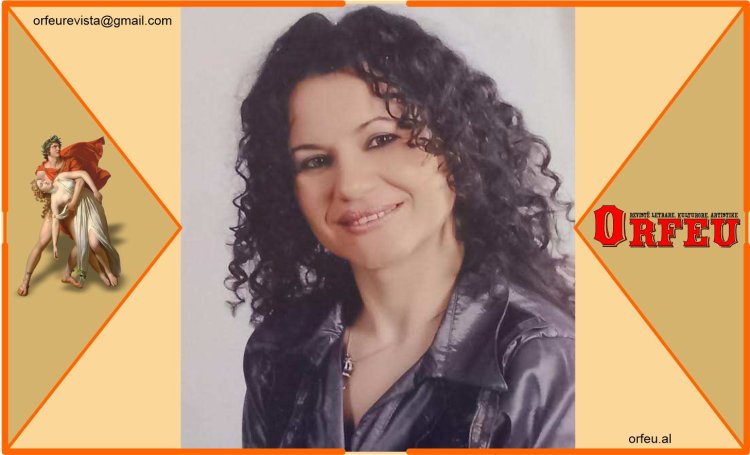



 Moderator
Moderator 